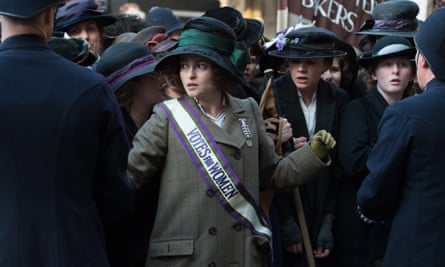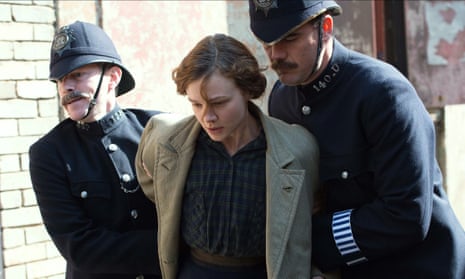Suffragette (2015)
Director: Sarah Gavron
Entertainment grade: B+
History grade: A-
The women’s suffrage movement began in earnest in the United Kingdom in the 19th century. Its militant wing, the Women’s Social and Political Union (WSPU), founded and directed by Emmeline Pankhurst, was active from 1903.
Society
Suffragette begins in 1912 with fictional laundress Maud Watts (Carey Mulligan) enduring dangerous and exploitative working conditions, including sexual harassment on the job. It’s unusual and commendable that this film chooses to focus on the story of a working-class suffragette, rather than the upper-middle class women who were the movement’s celebrities. There’s easily enough mileage in the Pankhurst family for a miniseries, and it is generally easier for producers to sell historical films if they’re about someone who already has big-name recognition – so this may not have been an easy decision for the film-makers. Maud doesn’t have all the privileges the posh suffragettes enjoy, such as a supportive husband, the freedom not to have a day job, or the means to bail themselves out of prison. Her working-class life is vividly and uncompromisingly realised; the subtle brilliance of Mulligan’s performance is especially evident as Maud’s relationship with her own son changes. This film does not see things through Downton Abbey-style rose-tinted lorgnettes.
Nationality
Maud falls into the suffragette movement by accident, but is so shocked by the violent response she faces from David Lloyd George (Adrian Schiller)’s government that she becomes increasingly militant. Viewers may be disappointed that the film’s Lloyd George has no detectable Welsh accent, but that’s historically correct. Though Britain’s only Welsh prime minister to date spoke Welsh at home, he spoke English with an English accent in the 1910s. (Recordings imply that he acquired a stronger Welsh lilt by the 1930s.)
Race relations
Maud’s new suffragette friends take her to see Emmeline Pankhurst (Meryl Streep) emerge from her Cat and Mouse Act imprisonment briefly to address the faithful. “I’d rather be a rebel than a slave,” Mrs Pankhurst says – a quote which the film’s publicity team put on T-shirts. This got them into some hot water, especially in the United States where the women’s suffrage movement had an explicit streak of racism: some American suffragists even argued that giving white women the vote was essential to safeguard “white supremacy”. In Britain, while there were notable non-white suffragettes like Princess Sophia Duleep Singh, they were often frustrated by the pro-empire and racist views within the movement. Emmeline Pankhurst made the startlingly ignorant remark in 1912 that for women, not having the vote meant “the most appalling slavery, compared with which negro slavery falls into insignificance”.

Terrorism
Suffragette doesn’t really get to grips with whether “deeds not words” was morally or strategically justified. Chemist Edith Ellyn (Helena Bonham Carter) emphasises at one point that no people should be harmed in the course of blowing things up. The film also glances off a storyline about Ellyn becoming so obsessed with obeying Pankhurst’s instructions that she alienates her followers. The characters opposed to women voting in this movie were always likely to be your basic villains, but in real life there were plenty of decent pro-suffrage people opposed to violence. Meanwhile, Maud buddies up with Emily Wilding Davison (Natalie Press), who is of course on her way to commit the most memorable of all suffragette spectaculars. Historians still argue about whether or not Davison meant to kill herself at the Derby. In the film it is vaguely hinted that she probably does. She turns to Maud beforehand and says their slogan: “Never surrender. Never give up the fight.” It might be more moving if the viewer were not reminded of Galaxy Quest’s catchphrase: “Never give up. Never surrender.”
The vote
There’s a narrative problem for this movie in that the deeds of the suffragettes did not directly result in women getting the vote. When the first world war broke out in 1914 (an event which isn’t in the film), the WSPU suspended its direct action campaign. At this time, around 40% of British men still could not vote. There was a minimum wealth qualification: even chaps had to prove they were paying at least £10 rent a year or held £10 worth of land. After the war, it was felt that it would be unacceptable to continue to deny the vote to men who had just served in the trenches. The Representation of the People Act 1918 enfranchised all men over the age of 21. It also gave the vote to women over 30 who were members of the local government register (or were married to a member), owned property, or were graduates voting in university constituencies. The non-violent campaigns of the suffragists undoubtedly changed attitudes, but historians still debate whether the violent actions of the suffragettes helped or hindered their cause. The film evades this issue by ending on the dramatic emotional moment of Davison’s funeral in 1913. British women were given the vote on equal terms to men in 1928.
Verdict
Suffragette is well-made and extremely moving in parts, especially its observations about working-class women’s lives – though it dodges some of the really hard questions.

Comments (…)
Sign in or create your Guardian account to join the discussion